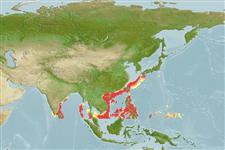Environment: milieu / climate zone / depth range / distribution range
Ecology
Marine; reef-associated; depth range 10 - 297 m (Ref. 90102). Tropical; 32°N - 6°N, 30°E - 155°E
Indo-West Pacific: South Africa (off Durban) east to southern Japan, the Caroline Islands, and eastern Australia.
Size / Weight / Age
Maturity: Lm ? range ? - ? cm
Max length : 23.0 cm TL male/unsexed; (Ref. 4313)
Dorsal spines (total): 12; Dorsal soft rays (total): 9; Anal spines: 3; Anal soft rays: 5. Highly variable in color and in appendages in relation to habitat. Covered with appendages on algae reefs, but plain when deep with sponges (Ref. 48635). Body highly compressed and covered with weed-like tassels (Ref. 37816).
Found in rich soft-bottom habitats in current prone channels (Ref. 48635); also in rocky or coralline habitats near algae where it camouflages itself. Hunts prey at night like other species of scorpaenids, feeding on fish and small invertebrates. Solitary among corals, rocks and weeds (Ref 90102).
Life cycle and mating behavior
Maturity | Reproduction | Spawning | Eggs | Fecundity | Larvae
Myers, R.F., 1991. Micronesian reef fishes. Second Ed. Coral Graphics, Barrigada, Guam. 298 p. (Ref. 1602)
IUCN Red List Status (Ref. 130435: Version 2024-1)
Human uses
Fisheries: of no interest; aquarium: commercial
Tools
Special reports
Download XML
Internet sources
Estimates based on models
Preferred temperature (Ref.
123201): 17.5 - 27.2, mean 21 °C (based on 186 cells).
Phylogenetic diversity index (Ref.
82804): PD
50 = 0.5156 [Uniqueness, from 0.5 = low to 2.0 = high].
Bayesian length-weight: a=0.01778 (0.00689 - 0.04588), b=3.04 (2.82 - 3.26), in cm total length, based on LWR estimates for this (Sub)family-body shape (Ref.
93245).
Trophic level (Ref.
69278): 4.0 ±0.60 se; based on food items.
Resilience (Ref.
120179): Medium, minimum population doubling time 1.4 - 4.4 years (Preliminary K or Fecundity.).
Fishing Vulnerability (Ref.
59153): Low vulnerability (13 of 100).
